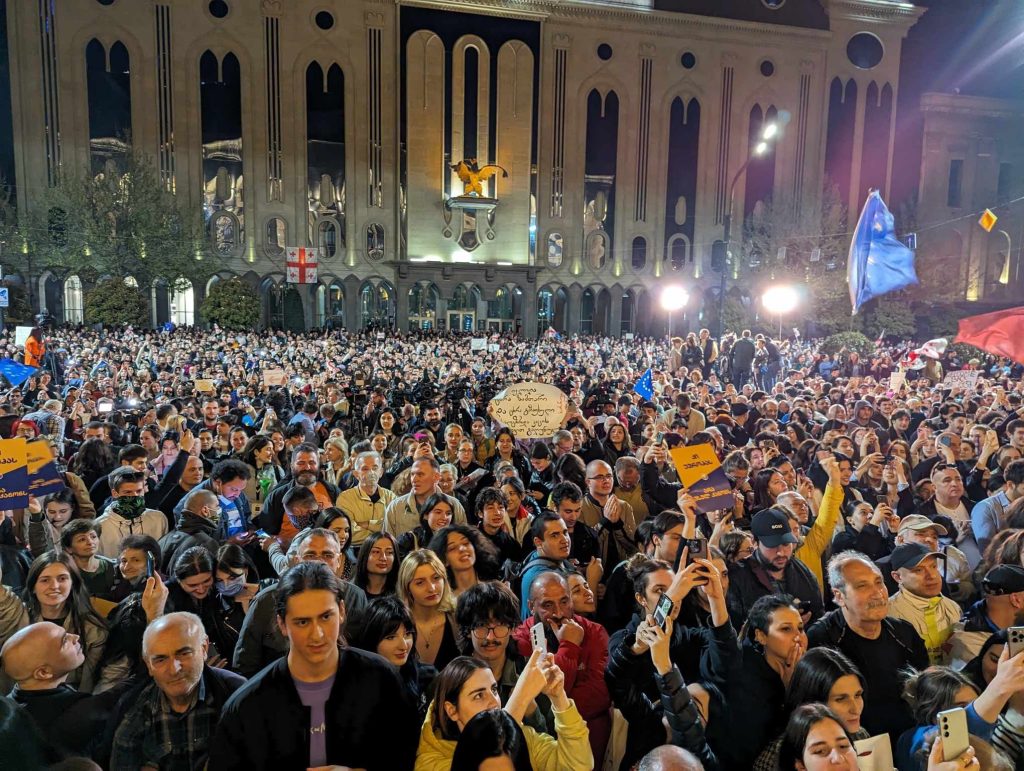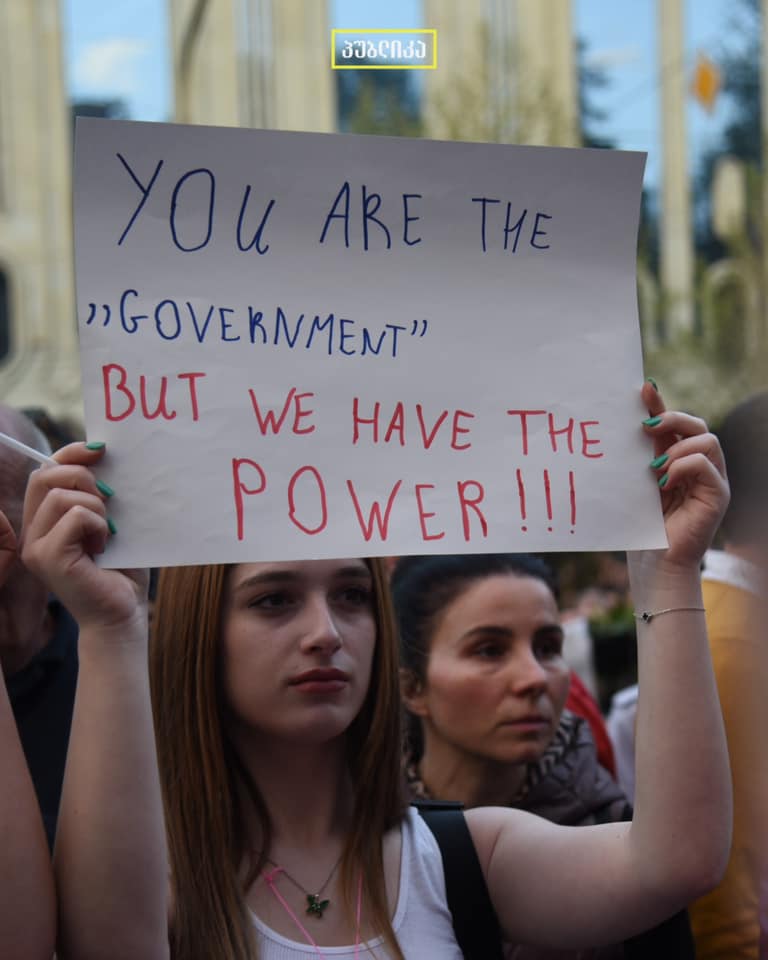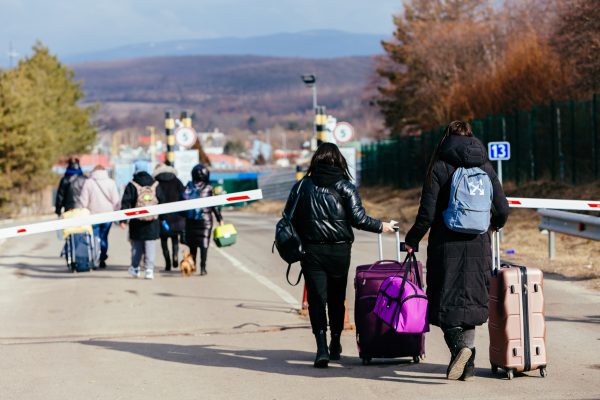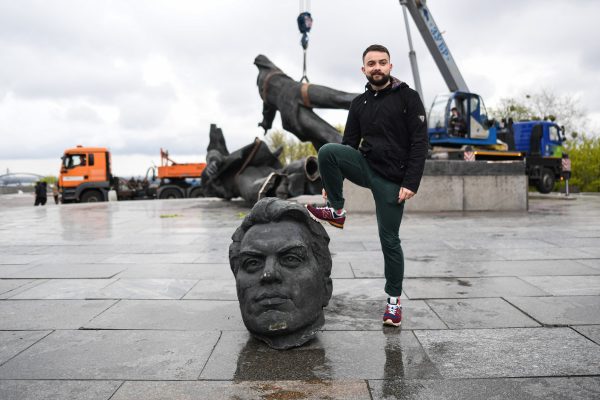Thirty-five years after Georgians paid with their lives to rally for independence and liberation in the streets outside parliament in Tbilisi, they returned this month, gathering again to defend their freedom.
The tens of thousands who have been on the streets for the past week have spanned all of society, from the young to the elderly, from the so-called Silent Generation to Gen Alpha, to actors, sportsmen, dancers, painters, writers, professors, civic activists, and public servants (and to this author and her friends) as we remembered the tragedy of April 9, 1989, when 21 Georgians were massacred by Soviet troops.
But this was not just a commemoration. The protest was caused by the Georgian government’s plan to reintroduce a foreign agent law — albeit by another name — that was dropped last year and that the demonstrators see as a route toward Kremlin-style despotism.
“Yes to Europe! No to Russian Law!” the placards read. And “Never back to the USSR!”, and “The River of People will flow and will not stop”, and “We are free, we will never be Slaves to Russia!”, “United we Stand, Divided we Fall!”
The crowd was swelled by Russians who had sought refuge in Georgia and who raised their voices in solidarity. “I’m Russian and I’m protesting Russian law,” one placard read.

Players from the Georgian national soccer team — elevated to hero status after qualifying for the European Championships for the first time — also offered support, underlining the breadth of public sentiment. Opinion polls show 75%-80% of Georgians back European Union (EU) membership including its requirements for compliance with the rule of law and democratic norms.
The trigger for the protests was the ruling Georgian Dream Party re-introducing the Transparency of Foreign Influence Bill, which would require many voluntary groups, so-called NGOs, and media outlets to register as agents of foreign governments. It would severely threaten the operational effectiveness and credibility of essential institutions, the protesters said.
Despite street protests and international criticism, on April 15, the Georgian parliament gave its initial consent to the bill, which will need to pass through two further legislative hurdles before becoming law. Georgian Dream’s chair Irakli Garibashvili said on April 20 that the country was not ready for EU membership but once it was, the foreign agent law might be repealed. The party announced its own rally for April 29 to support the supposed transparency of the draft law and to back its plans for a crackdown on what it termed LGBT+ propaganda. The EU says Georgia cannot enter with the legislation still in force, while the US called the law “Kremlin-inspired.”
The legislation would force NGOs and independent media organizations receiving more than 20% of their funding from abroad to register as “organizations carrying out the interests of a foreign power.”
Similar laws have been imposed in other countries, often arising from government efforts to control dissent, silence critics and crush those who aim to achieve transparency and accountability. The goal is to stigmatize civil society and media organizations, erode public trust, hinder their activities, and restrict their functioning campaigners say.
The governing Georgian Dream Party’s decision to revive the proposed law after dropping it last year following mass protests is widely seen as leanings toward authoritarianism rather than bolstering democratic ideals and underscoring a disturbing trend in Georgian politics toward increasingly restrictive legislation.
Despite the leadership’s claims of aligning with European standards of transparency, Georgian civil society, media, and the broader public have denounced the law as carrying the smell of the Kremlin and Russian President Vladimir Putin. Georgia’s President Salome Zurabishvili said the legislation was a copy of Russia’s repressive laws and was designed to obstruct her country’s future EU)membership.
Only four months ago, the EU opened the door to Georgian membership by agreeing to candidate status. Russian Foreign Minister Sergei Lavrov and other senior Russian officials have offered support for the legislation.
The experiences of countries like Russia, Belarus, and more recently Kyrgyzstan, where similar laws have been enacted, provide a stark blueprint of the potential consequences. Such legislation has stifled civil society, violated international human rights standards, and undermined trust in vital charities and support organizations. Most of the free media has been closed or forced into exile.
If passed, the law would give the Ministry of Justice extensive powers to investigate and monitor organizations, even on the basis of anonymous tip-offs, reviving fears of Soviet-era denunciations.
“Transparency in civil society sector isn’t the issue — it’s regulated by more than 10 Georgian legislative acts, and we comply fully,“ said Mikheil Mirziashvili, Chairman of the Center for Development and Democracy (CDD), who has worked for NGOs for over 30 years. “We strongly reject this new regulation and will resist it vehemently if adopted. We’ll exhaust every legal avenue, at home and internationally, to avoid the unfair label of being foreign agents.“

The law would also allow authorities unprecedented access to personal data under the pretext of investigations, threatening the operational capacity of NGOs and journalists while making vulnerable those who want to support them.
“If adopted, this law will brand independent media as ‘enemies of the people,’ making our work in Georgia nearly impossible,” said Lika Zakashvili, editor-in-chief of Publica. “People trust us with their stories of persecution and harassment by the authorities. How can they feel safe if we’re labeled as foreign agents? We will not comply with this unjust law that violates our citizens’ dignity and unjustly labels us.”
The law would facilitate arbitrary inspections and sanctions, which could disrupt critical operations and deter donors. This chilling effect on funding and operational capacity risks crippling essential services for vulnerable groups, including children, women, the disabled, and the displaced.
More than 200 organizations have ended cooperation with parliament in protest, and more than 400 have denounced the law.
Pro-Europeans are in the streets. And whatever the government may have hoped, there’s no sign at all that they will leave.
Ketevan (Kate) Chachava is a Non-resident Fellow with the Democratic Resilience Program at the Center for European Policy Analysis (CEPA.) She is a Georgian civic and democracy activist and is the executive director and founder of the Tbilisi-based Center for Development and Democracy (CDD), founder and Chairperson of Sector 3 – Hub for Development, and founder and board member of a socially-oriented NGO “YouCreator. Ketevan holds a post-graduate diploma in Strategic Communications from King’s College London and is the mother of four amazing children.
Europe’s Edge is CEPA’s online journal covering critical topics on the foreign policy docket across Europe and North America. All opinions are those of the author and do not necessarily represent the position or views of the institutions they represent or the Center for European Policy Analysis.





